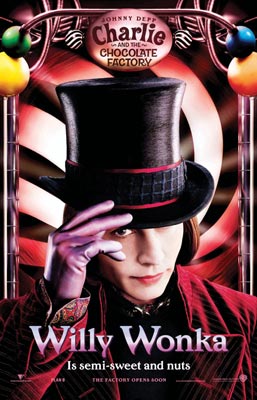There’s a new TV spot for Tim Burton’s Charlie and the Chocolate Factory up at The Movie Box. While not that exciting in itself, it’s an excuse to point you towards the full length trailer that has been around a while now, which is hosted from the same page. This is undoubtedly the weirdest piece of promotional material ever to be released by a major studio: it’s strange even by Tim Burton standards.
 While the first adaptation of Roald Dahl’s novel (Mel Stuart’s Willy Wonka and the Chocolate Factory, from 1971) has its virtues, I don’t think it was such a perfect version that the book doesn’t deserve another go-round. Dahl, incidentally, hated the original film despite having been credited with its screenplay (which was actually largely rewritten by David Seltzer, who later scripted The Omen). One of the things he professed to dislike most is the one thing that is usually regarded as unequivocally successful: the casting of Gene Wilder as Wonka. Wilder’s performance – alternately funny and creepy – is probably the highpoint of his career, and perfectly captures the deliberately off-putting Wonka from the novel. Dahl’s alternate casting choices, however, are intriguing: he wanted Peter Sellers or Spike Milligan.
While the first adaptation of Roald Dahl’s novel (Mel Stuart’s Willy Wonka and the Chocolate Factory, from 1971) has its virtues, I don’t think it was such a perfect version that the book doesn’t deserve another go-round. Dahl, incidentally, hated the original film despite having been credited with its screenplay (which was actually largely rewritten by David Seltzer, who later scripted The Omen). One of the things he professed to dislike most is the one thing that is usually regarded as unequivocally successful: the casting of Gene Wilder as Wonka. Wilder’s performance – alternately funny and creepy – is probably the highpoint of his career, and perfectly captures the deliberately off-putting Wonka from the novel. Dahl’s alternate casting choices, however, are intriguing: he wanted Peter Sellers or Spike Milligan.
The Milligan / Sellers version of Wonka is just one example in Dahl’s career of fascinating collaborations that either didn’t come to fruition or which resulted in disappointing end results. An example of the former is Dahl’s working with Walt Disney on a wartime fantasy called The Gremlins: it resulted in his first children’s book, illustrated with Disney artwork, but the planned film fell through. A disappointment was Dahl’s script for the Bond film You Only Live Twice. Dahl should have been ideal for scripting a Bond movie: he knew Ian Fleming, had a background working on the fringes of the intelligence community, and his writing style – particularly in his adult books – is often very close to Fleming’s. Yet in his screenplay he was at his most undisciplined and hyperbolic, and You Only Live Twice turned out to be the most boring of the 60s Bond films.
It probably says something about Dahl himself that the best films of his work have all occurred after his death, when directors with a strong vision could better assert their own approach to the material. It almost seems surprising that Burton has taken this long to get around to directing a Dahl adaptation (although he did previously produce Henry Selick’s take on James & the Giant Peach): his talent for a childlike point of view and comic-but-unsettling visuals seemingly make him a perfect fit. The casting of Depp as Wonka – pretty much inevitable once Burton was involved – also looks, from the trailer, to have worked out well. Hopefully this is will be the rare example of Dahl’s vision reaching the screen in a fully satisfactory form.